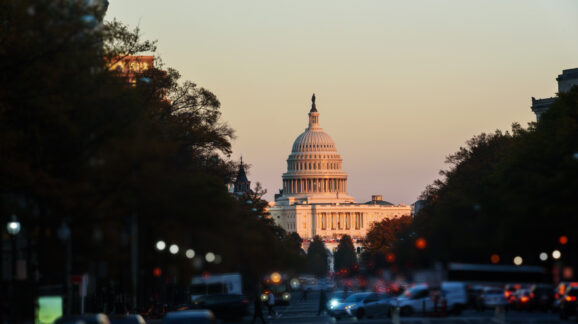Agenda for Congress: Inflation

Photo Credit: Getty
CEI’s new Agenda for Congress is out now. Each chapter contains pro-market policy recommendations in areas where CEI has expertise. Here are the ones from the chapter on inflation:
- Spend less and lower the budget deficit;
- Ensure the Fed’s independence with a monetary policy rule; and
- Oppose efforts to expand the Fed’s dual mandate to include non-economic issues such as climate and social justice.
Neither party has credibility on spending restraint. Still, one can hope that one day Washington will live within its means. Considering how unpopular inflation is with voters, at some point politicians will realize that entitlement reform and other non-optional measures are in their political interest. Until that happens, inflation will be harder to corral than it needs to be.
Congress should also Trump-proof the Fed by giving it a binding policy rule. Trump is the latest in a long line of presidents going back to at least Lyndon Johnson that has pressured the Fed to lower interest rates. While rate cuts can stimulate the economy, the tradeoff is often higher inflation. That’s the Fed’s call, not the president’s.
The idea behind a policy rule is that the Fed would automatically respond to economic changes according to a pre-determined formula, instead of using its discretion. The Fed did something like this during the Great Moderation, which was a low-inflation period that lasted from the mid-1980s until the 2007 financial crisis. The Fed informally followed a Taylor rule, which involves interest rate adjustments.
That Greenspan-era policy was informal. If Congress were to formally require the Fed to follow a Taylor rule or some other rule, like NGDP targeting, it would have a double benefit in fighting inflation.
One, markets would know what to expect, since the Fed would not have the discretion to panic, the way it did during COVID and the Great Recession.
Two, the Fed would be better able to stand up against political bullying. The Fed can say, “I’m sorry sir, we can’t do that,” the next time an angry president demands economic stimulus leading up to an election.
Finally, the Fed should stick to its core mission of inflation control. An organization can typically do one thing well, or many things poorly. The Fed’s dual mandate is already problematic, since its current twin missions of inflation control and economic stimulus can contradict each other.
Adding requirements to use monetary policy to address environmental and equity issues will further hamper the Fed’s effectiveness. Better to let the Fed concentrate on its one proper job of keeping inflation low, and use other policy levers for other goals.
The full chapter on inflation is here. The full text of Free to Prosper: A Pro-Growth Agenda for the 119th Congress, with chapters on regulation, trade, energy, finance, and other issues, is here.